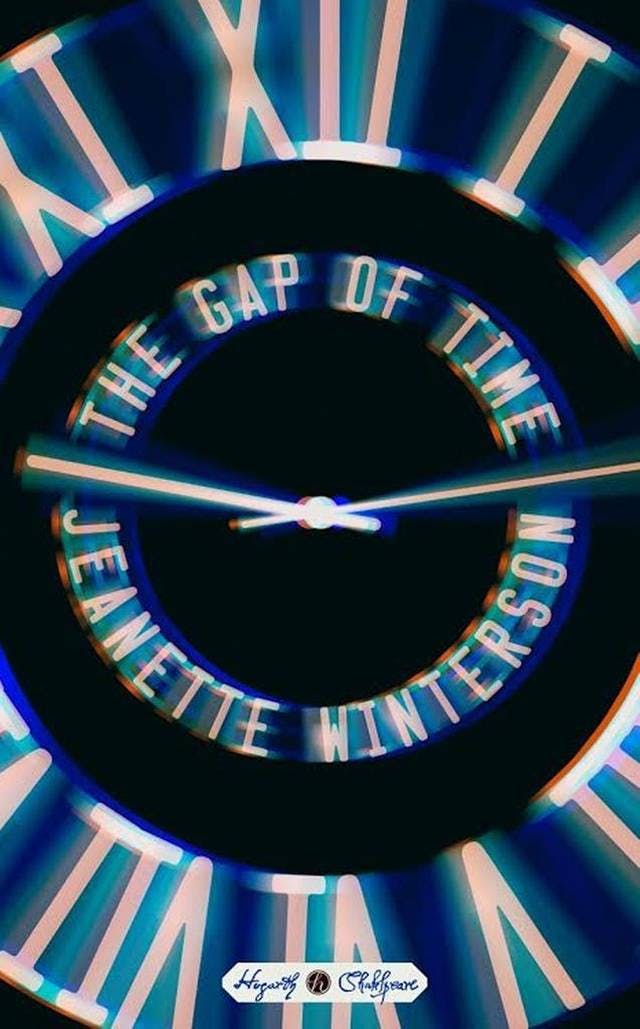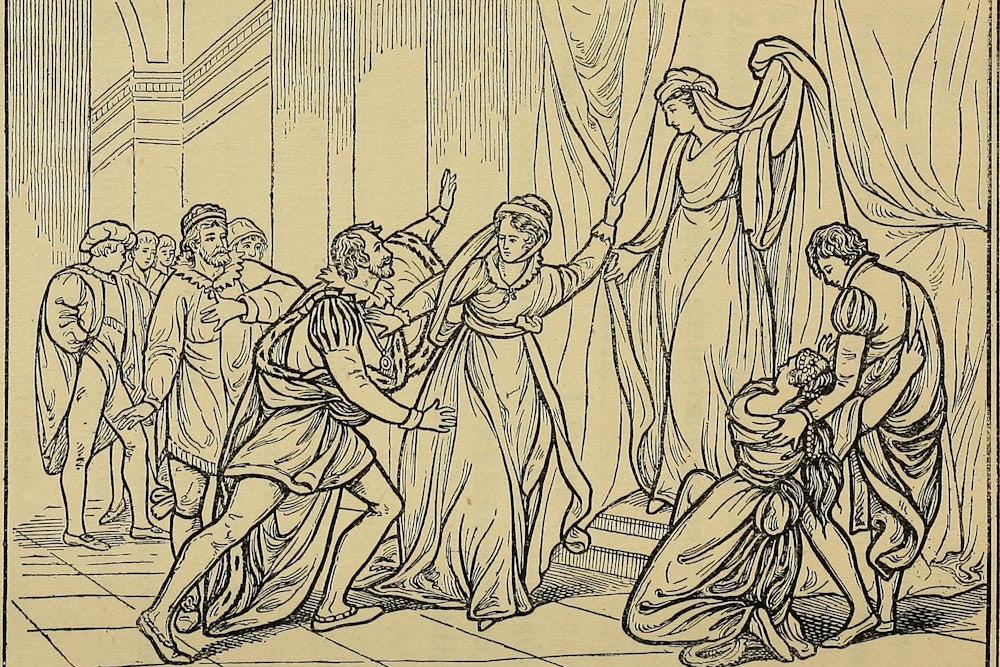To call Jeanette Winterson a novelist would be to sell her short. The novel is a limited thing, a technology like the bicycle pump or the gas stove. Stories are much older, a species constant, like cooking and language. Novels are fiction, while stories can be true or false or neither. “Trust me, I’m telling you stories,” Winterson repeats in The Passion, and it’s a line that could go beneath her name wherever it appears.
Winterson’s latest book The Gap of Time is a classic kind of story: a retelling. She played with the form a decade ago with Weight, a retelling of the myth of Atlas and Heracles. But where Weight was artfully jumbled, with Laika the space dog somehow playing a big role, Gap of Time is a realist update of Shakespeare’s The Winter’s Tale. It’s a strange choice: Why not do one of the more dramatic plays, like Macbeth or Othello? With its “happily ever after” pat conclusion, Winter’s Tale is Oedipus for kids. The play is best known for including the most famous stage direction of all time: “Exit, pursued by a bear.”
In an opening section, “The Original,” Winterson gives a concise four-page summary of Shakespeare’s story: There are two kings, childhood friends, one on an extended visit to the other. The host King Leontes (Winterson calls him Leo in the novel) is seized by the idea of an affair between his wife Hermione (Mimi) and his friend King Polixenes (Xeno). Leontes tries to kill Polixenes, disowns his newborn daughter and exiles her to uncertain fate. Hermione dies of grief. But the daughter Perdita is found by a kindly shepherd (Shep) and his clown son (Clo), who raise her well. When Perdita gets older she doesn’t accidentally fuck her dad or brother; she falls for Polixenes’s real son Florizel (Zel), and together they repair the relationship between their fathers and, somehow, bring Hermione back to life from a statue.
The rest of the book is called “The Cover Version,” and Winterson puts her own spin on the story. In the update, Leo and Xeno aren’t just boyhood friends, they were best friends and on occasion, lovers. Instead of 17th century central Europe, it’s set in the present day US and UK. Remixing A Separate Peace and Shakespeare could be gimmicky or too cute, but Winterson tells the queered story with a straight face. She is empathetic toward Leo, even when he assaults his wife in a delusional rage. He is no corporate closet-case caricature; Leo loves Mimi and Xeno, both of whom love him, and also sort of love each other, too. It’s a recipe for tragedy.
At first the story proceeds like one might expect based on the western dramatic tradition as it’s taught in American high schools. All that love turns to macho rage and murder plots, and the princess becomes a foundling. The foundling’s job in these sort of stories is predetermined. Oedipus, Moses, Simba: they all have to take vengeance one way or another. Born in violence, they are destined for more. We get Freud, Freud, and son of Freud.
Winterson’s Autolycus, a loveable scoundrel of a used-car dealer, explains Oedipus and the Complex to Clo, Perdita’s adoptive brother. If only, Autolycus bemoans, the Greeks had invented roundabouts, Oedipus would have never collided with Laius at the crossroads and we would have been spared an entire cultural history of neurosis. It’s a goofy joke, but goofy jokes are a venerable form of storytelling too. If Oedipus could have gone differently, then what’s to stop us from improving on his mistake? Are we doomed to tell the same story forever?

Autolycus said, “Clo—you know that story I told you this morning, about Oedipus?”
“Yeah, yeah,” said Clo, “What about it?”
“I am revising my thesis. It’s the fathers who kill the sons.”
“Who kills the daughters?” said Perdita.
“We all do,” said Xeno. “If the hero doesn’t kill you—call him Hamlet, call him Othello, call him Leontes, Don Giovanni, James Bond—still you’ll be the sacrifice for his soul.”
I don’t know if Winterson is referencing French theorists Gilles Deleuze and Félix Guattari explicitly, but the section could have come out of their book Anti-Oedipus:
Oedipus begins in the mind of the father. And the beginning is not absolute, it is only constituted starting from investments of the social historical field that are effected by the father. And if it passes over to the son, this is not by virtue of a familial heredity, but by virtue of a much more complex relationship that depends on the communication of the unconsciouses.
In other words, Oedipus is a story, perhaps even a true one—though when Autolycus describes the father-killing-mother-marrying Complex to Clo, he responds, “No that ain’t so! I don’t know a soul who’s done that even once”—and it gets its power from its telling. But even if Oedipus in his many masks is an important and enduring narrative, that doesn’t mean it has to be the only one. We can tell stories where no one kills the daughter, where son and father meet like people. Winter’s Tale is one of those stories, and Winterson makes a good case for telling it again.
Shep and Clo (who shelter and raise Perdita) and Autolycus (who
takes in absent Xeno’s son Zel) help make the difference. Unlike Oedipus who is
taken in by more royals, Perdita gets the superhero treatment: a humble but
loving adoptive family that hides her origins until she’s a smart, poised young
woman with ideas about her own life. Blood may be thicker than water, but
nature doesn’t always beat nurture, and sometimes the difference between comedy
and tragedy—life and death even—are the stories we hear about ourselves.
A long time ago I had a conversation with a retiring English
teacher at a wedding. He lamented that so much of the curriculum was made up of
tragedies: murder, betrayal, rape, incest, suicide, and maybe The Importance of Being Earnest thrown
in for laughs. The Odyssey passes for
fun, but it’s not a comedy when you retell it from the perspective of the
twelve hanged maids, as Margaret Atwood does in The Penelopiad. The teacher told me that he didn’t know much about
his students when they walk through the door. This was a while before the
debate over “trigger warnings,” but he worried that he had been compelled to
carelessly expose them to nothing but trauma. His fear wasn’t just that he was
accidentally harming kids who were already hurting, but also that he wasn’t
allowed to offer them other stories about the world or their own lives. There’s
not a roundabout in sight; as Winterson’s Autolycus says, “It’s crossroads all
the way.”
In the Western tradition, narratology (or the study of stories) begins with Aristotle’s Poetics. The hero’s tragic “fatal flaw” is elevated to the highest form of drama, while Aristotle’s section on comedy was lost to history. Aristotle had an appreciation for comedy, but his teacher Plato thought it was degenerate and foolishness ought to be tightly regulated. “We will impose such mimicry on slaves and foreign hirelings, and no serious attention shall ever be paid to it,” he wrote, “Nor shall any free man or free woman be seen learning it, and there must always be some novel feature in their mimic shows lest the public taste should be debased by the repeated exhibition of any one piece of vulgarity.” Stories matter, and a blood-and-gender-based caste society shouldn’t hear too many about people being things they’re not and everything turning out okay.
The Gap of Time has a happy ending, which, in Aristotle’s formulation, means it qualifies as a comedy. The Winter’s Tale gets called a comedy for the same reason, but also because its happy ending seems so implausible and tacked on. Instead of going off, the gun introduced in Act I is unloaded and unfired in Act V. The fatal flaw survived. It goes contrary to what we know about stories: Simba has to kill Scar. Anything else is silly.
Winterson’s ending is silly. Just about everyone ends up satisfied. At the last moment, Winterson reveals that the sexy sophisticated secretary who walks off into the sunset with Clo is trans. When I first read it I thought this detail felt dropped in, superfluous, perhaps a laudable political nudge in the UK where some popular feminists have refused to recognize trans women, but artistically awkward. Winterson’s art, however, is storytelling, and being able to include more listeners is a cardinal virtue for storytellers in a way it isn’t for novelists. This reveal is the kind of closing choice a storyteller might make when they look to their listeners and elect to give everyone the happy ending they deserve. At least this time.
But getting to comedy from tragedy requires an intermediate term. Forgiveness, in Winterson’s telling, is not a punchline or an excuse for bad behavior, it’s the only alternative to Oedipus. In a postscript (albeit one that’s not marked as such) Winterson reflects on the ending:
The Winter’s Tale revisits Othello. A man who would rather murder the world than change himself. But this time the heroine doesn’t have to die in service of the hero’s delusions…. Hermione doesn’t die. And Leontes and Polixenes don’t die either. And the future is secured because Florizel and Perdita won’t behave like their fathers. Will they?
Forgiveness. Here are only three possible endings to a story—if you put aside And They All Lived Happily Ever After, which isn’t an ending, but a coda.
The three possible endings are:
Revenge. Tragedy. Forgiveness.
The storyteller has three options, and if revenge ends in tragedy, then only two. It’s easier to grieve tragedy than to laugh with forgiveness; it takes mental infrastructure to understand a narrative, and the Oedipus crossroads are well-paved. In The Gap of Time Winterson tells the harder story. She builds us a roundabout.
